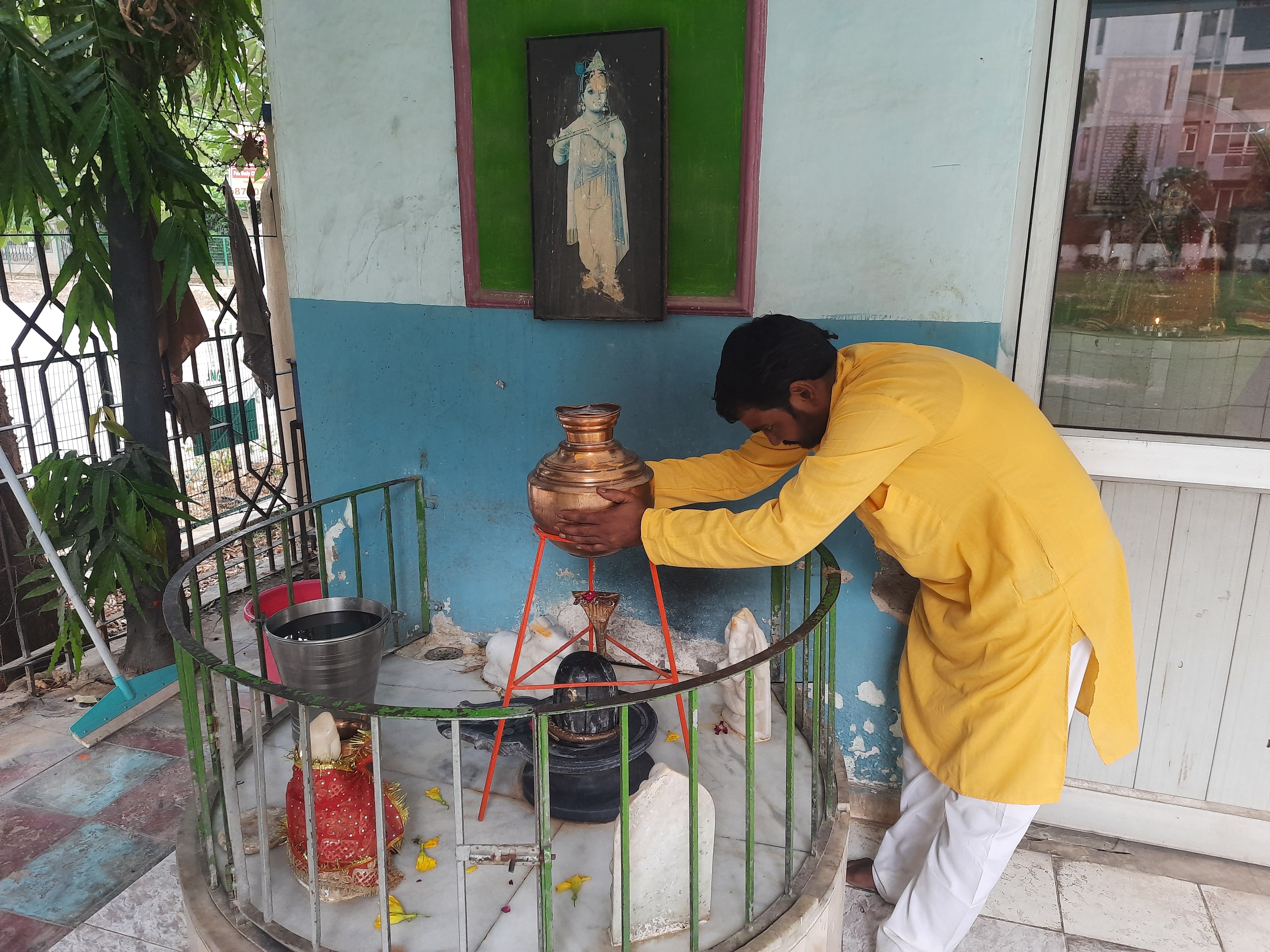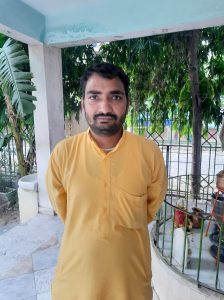
In BJP-ruled Gurugram, Hindu priests bear brunt of COVID; others better off

The COVID pandemic has hit the financial condition of priests belonging to various religious denominations. In Delhi’s neighbourhood Gurugram, which comes under Haryana, Hindu priests are worse off than their counterparts in Muslim and Christian communities in the absence of institutional support.
While ‘maulvis’ are to some extent supported by the Haryana State Wakf Board or trusts managing individual mosques, their Christian colleagues are supported either by the community or the church they serve in. In the case of Hindu priests, the BJP-ruled state government financially supports merely 10 priests of one government-run temple while a few hundred others have to fend for themselves.
Radhe Kishan Bhardwaj, a Hindu priest, has the responsibility of taking care of 10 members of his family. Born in the Mathura district of Uttar Pradesh, Bhardwaj has been living in Gurugram, India’s Millennium City, for over a decade.
Also read: 13 yrs since training, 203 non-Brahmin priests wait for appointment in TN
“Gurgaon (Gurugram is the official name) is my home. I’ve been staying here for 15 years. In these years, I have performed several pujas at temples and private ceremonies. But since the pandemic struck, I have not been able to perform any ritual as nobody is willing to call priests,” Bhardwaj told The Federal. He is among hundreds of priests who have been facing a severe financial crisis due to COVID-19.
In Gurugram, there are around 3000 Hindu priests who earn their livelihood by performing puja. The source of their income is the honorarium which they receive after performing the ritual at temples and in family events.

“In pre-pandemic days, I was able to earn ₹ 15,000- 20,000 in a month by performing puja, but now, I am only able to earn ₹ 6,000. I have two sisters living with me, and I have to marry them off next month. My income is meagre, so I will have to take loans from my relatives and friends to pay for the wedding expenses. There is no other way.”
Kishan earns his monthly income from a cooperative society that pays him to keep a temple within its premises clean and perform evening prayers. To earn extra, he has also taken up an additional role as a caretaker in the same cooperative society since March.
As COVID spreads through aerosols and droplets — the fear of getting exposed to the disease through direct contact has been the biggest reason behind pundits not being asked to perform pujas.
Narrating a similar story, pandit Madan Mohan told The Federal that he is facing difficulty in paying fees for his kids’ education.
Also read: Hindu priests in South Africa overcharging for funerals of COVID-19 victims
“I have seven people in my family, including my parents. I go to a temple located inside a cooperative society and get a monthly salary of Rs. 4,000. I have no other work. I have taken a loan from moneylenders to pay for the education of my kids, as I can’t afford to educate them on my own,” says Mohan.
Christian priests have largely been able to sustain themselves and their families with voluntary support from the community. In the case of imams, either the Wakf Board under the Haryana government or private trusts that run mosques pay them monthly salaries.
Daman Rodgers, pastor of Epiphany Church in Civil Lines, said, “We are not facing a financial crisis. However, since churches are closed, I wouldn’t say we have not been affected by the pandemic.”
Of the 130 churches in Gurgaon – around 10 are mainline churches regulated by a trust. The remaining ones are unregistered home churches which are run by individual priests.
In either case, the state government has no role in regulating the churches.
Pastor Rodgers said the priests who are associated with mainline churches receive a monthly emolument by the trust. The priests of home churches get their honorarium through donations made by families.
“However, most priests of home churches are not completely dependent on their church for their financial needs, as they have a side job,” said Rodgers.
As for the Muslim community, the state government through the Haryana Waqf Board – a statutory board established through Waqf Act, 1995 – pays monthly emoluments to the clerics who are associated with the mosques that are administered by it. There are 84 mosques in Gurugram district of which 21 are regulated by the Wakf. The rest are largely managed by private trusts.
Aslam Khan, a member of the Haryana Anjuman Charitable Trust that oversees the Anjuman Jama Masjid in the district, said that Imams and other clerics of the Islamic community are not facing financial difficulties as they are associated with several mosques which pay monthly emoluments.
“No Muslim cleric is facing financial problems. The mosques in the district are either regulated by the Haryana Waqf Board or by Trusts, like ours. And these institutions pay a monthly honorarium to Imams, Muazzins, Alims and other clerics,” said Khan.
With respect to the Hindu priests, the Haryana government’s role in providing them with financial aid is limited and is linked with the temples which it administers.
In Gurugram, amid thousands of temples, the Sheetla Mata Mandir, a temple built to honour Guru Mata Kripi who was the wife of Guru Dronacharya of Mahabharata, is the only temple administered by the government through Shri Mata Sheetla Devi Shrine Board.
It is pujaris — 10 of them — who perform rituals in the temple — are selected by members of the shrine board and are the ones who receive remuneration for their services every month.
Other pandits who are not associated with the Sheetla Mata Mandir don’t get any emolument or aid from the state government.
As there are hundreds of pundits whose incomes depend on performing pujas at private ceremonies and temples (that aren’t government-administered), they are unable to get any financial support from the state government.
Niraj Tiwari, a pandit who lives in Ghata village of the district, says: “We are also priests. If the government can help the priests of Sheetla Mata Mandir, who are paid ₹ 20,000-25,000 per month, why can’t they help us? I have four members in my family to support.”
“The entire Brahmin samaj (Hindu priests’ community) voted for the ruling BJP party in the state. We feel cheated. We are facing tough times and not getting any help. I want the government to listen to us,” said Tiwari.
Also read: Lockdowns are throwing lives of urban poor in total disarray
Reacting to the plight of the Hindu pundits, Vinod Bansal, the national spokesperson of the Vishwa Hindu Parishad, said: “There are several state governments who pay monthly honorariums to imams. If the Haryana government can support Muslim clerics, they should also support our pandits.”
Bansal said an institution should be set up where the state government would enroll pundits and pay them every month. “In these difficult times, this should be done at least temporarily.”
Also, as several pundits across the country are now adopting the virtual medium to reach out to individuals, families and temples, the VHP spokesperson appealed to the residents of the district to conduct pujas and ask pundits to be present virtually. “With the use of the digital medium, our priests will be able to perform rituals and receive honorariums to sustain their families,” he said.
“If any of our pundits need food to eat, they can call us and we will provide home-cooked food to them,” Bansal said. Among the three Hindu priests who shared their experience with The Federal, Niraj is the only priest who has been able to perform pujas through the digital medium.
“In the previous month, I performed three rituals virtually and was paid ₹5,000. The virtual medium has brought in some respite but it’s not enough,” he said.


